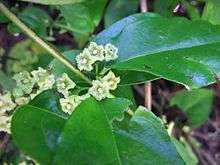Geniostoma
| Geniostoma | |
|---|---|
 | |
| Geniostoma ligustrifolium | |
| Scientific classification | |
| Kingdom: | Plantae |
| (unranked): | Angiosperms |
| (unranked): | Eudicots |
| (unranked): | Asterids |
| Order: | Gentianales |
| Family: | Loganiaceae |
| Genus: | Geniostoma J.R.Forst. & G.Forst. |
Geniostoma is a genus of around 25 species of flowering plants in the family Loganiaceae. They are shrubs or small trees, with inflorescences borne in the axils of the simple, petiolate, oppositely-arranged leaves.[1] The flowers are arranged in cymes, and each is pentamerous.[1]
The name Geniostoma derives from the Greek roots geneion ("beard") and στόμα (stoma; "mouth"), referring to the hairs in the corolla tube of some species.[2] The genus is widely distributed across the Pacific Ocean from Japan, Malesia to Australia in the west, and east to the Tuamotu Archipelago; one species is also found on the Mascarene Islands.[2]
The Hawaiian endemic genus Labordia has been included in Geniostoma by some authors.[2][3] These two genera have been grouped together in the family "Geniostomaceae",[4] but are considered by the Angiosperm Phylogeny Group to be part of a wider Loganiaceae.[5]
Selected species
- Geniostoma astylum
- Geniostoma clavigerum
- Geniostoma confertiflorum
- Geniostoma gagneae
- Geniostoma huttonii (Lord Howe Island)
- Geniostoma ligustrifolium – hangehange
- Geniostoma macrophyllum
- Geniostoma petiolosum (Lord Howe Island)
- Geniostoma quadrangulare
- Geniostoma rapense
- Geniostoma rupestre
- Geniostoma stipulare
- Geniostoma umbellatum
- Geniostoma uninervium
Further reading
- B. J. Conn (1980). "A taxonomic revision of Geniostoma subg. Geniostoma (Loganiaceae)". Blumea. 26 (2): 245–364.
References
- 1 2 Li Ping-tao & Antony J. M. Leewenberg. "Geniostoma J. R. Forster & G. Forster". Myrsinaceae through Loganiaceae. Flora of China. 15.
- 1 2 3 "Geniostoma". Flora of Australia Online. Australian National Botanic Gardens. Retrieved March 9, 2012.
- ↑ "List of genera in family Loganiaceae". Vascular Plant Families and Genera. Royal Botanic Gardens, Kew. Retrieved March 9, 2012.
- ↑ D. J. Mabberley (1997). The Plant-book: a Portable Dictionary of the Vascular Plants (2nd ed.). Cambridge University Press. p. 296. ISBN 9780521414210.
- ↑ P. F. Stevens. "Angiosperm Phylogeny Website". Retrieved March 9, 2012.